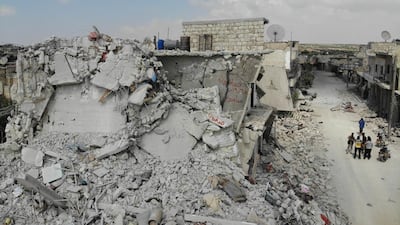Ever since the Syrian president Bashar Al Assad trapped the majority of the Syrian armed opposition groups in the final rebel-held enclave of Idlib, the world has feared a full-scale assault. With three million stranded there, the death toll would be colossal.
But following two months of air and ground assault from Syrian government forces and their Russian allies, the Assad regime is no closer to regaining the province. On average, more than a dozen regime fighters have died every day, while at least 629 civilians have been killed and 330,000 displaced since April, according to the Syrian Observatory for Human Rights. Idlib is under siege, but it has demonstrated the limits of Syrian and Russian airpower.
The faltering offensive could now draw Turkey into the fray. Ankara, which supports rebels in Idlib, signed a ceasefire with Moscow last year, which collapsed in April after violations on both sides. After repeated setbacks in its regional policies and particularly in Syria, Turkey is now keen to set the agenda. And while Ankara’s policy in Syria is complex – Turkey enjoys close ties with Russia and Iran, has sought the downfall of the Syrian president and sees the Kurds as its main threat – President Recep Tayyip Erdogan has yet to clarify what his overall strategy is in Syria. Ankara will host the leaders of Tehran and Moscow in August, in an effort to influence the next phase of the war.
There is reason to fear Turkey's plans. Having, controversially, taken delivery this week of the Russian S-400 missile defence system, which could attract fresh US sanctions, Ankara is flexing its muscles.
In recent days, the Turkish army has amassed troops and heavy weapons along the Syrian border. While any operation would likely target Syrian Kurdish forces – which Ankara regards as terrorists– the fighting could spill over into Idlib. The US military is keeping a close eye on its Turkish counterparts.
Once again, Idlib is at the centre of a tug of war. Although many extremists dwell there, so too do many millions of innocent Syrians. They urgently need an end to the violence but will not feel safe placing their lives in Mr Erdogan’s hands.

